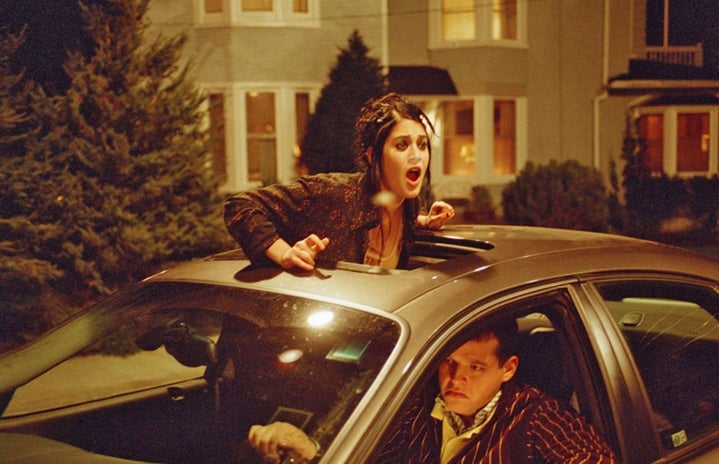Over the past few years, language has become something that society is more mindful of. In 2022, we’re more cognizant of things like using correct pronouns both in-person and online, as well as how to incorporate intersectionality and inclusivity in our everyday language. Thinking before we speak is an important practice that many social movements have helped remind us of, though there’s one phrase in particular that seems hard to shake: bitch.
On its surface, using the word “bitch” might seem relatively harmless. Historically, the word has been around for centuries. It originally referred to a “female dog,” though by the 15th century, men began using it in reference to women. From 1915 to 1930, its use in writing doubled, coinciding with the suffrage movement. Today, it has become so ingrained in cultural use that it’s regularly heard in music, film, television, and in everyday conversation. We throw it around when we’re with friends, and rarely is it surprising to hear in an informal setting. We use it out of frustration, when making a joke, and even while slandering a woman we don’t like. But it’s harmless, right?
Not exactly.
In my own life, I’ve been guilty of using this word in all of the above contexts. It disappoints me to think of the ways that I was so careless with a word that I now know is anything but meaningless. Understanding the deeper meaning of the word has allowed me to reflect on the ways that I was perceiving myself and other women. Rather than showing my support and admiration for other women, my use of the word aligned me with harmful ideas and labels.
IT’S A Gendered Word Used To Belittle OTHERS
For one, the term is inherently misogynistic and gendered. When used by men against women, its intent is to disparage. This can happen when women say or do something that men don’t like — especially if those women are in positions of power. When women are assertive or simply have an opinion of their own, they’re deemed as difficult and, therefore, “a bitch.” But when the term is used to refer to other men’s behavior, such as saying, “you’re acting like a little bitch,” the subtext says that anything associated with women or femininity is humiliating. It implies that showing emotion or being vulnerable is a weakness that only women can express. And when women use the term against each other, it only reinforces the stereotype that women are inherently catty and can’t get along.
ITS CONNOTATION IS HARMFUL BEYOND THE SURFACE
Generally speaking, it’s unlikely that most people are considering these deeper implications when they use the word. Still, the consequences have real and lasting effects. Women whose outspokenness isn’t valued in the workplace might be passed over for promotions or raises, furthering the gender wage gap. In fact, women face a double standard that makes professional life difficult to navigate. Whereas men are applauded for traits such as strength, confidence and decisiveness, women who display these same qualities are often admonished for them or are interrupted when they do speak up. Additionally, in situations where men don’t feel that they can be honest about their mental health struggles for fear of being criticized, it can lead increased rates of suicide or self-harm.
We’ve also seen public figures like Alexandria Ocasio-Cortez have to respond to a colleague calling her a “f****** bitch” on the steps of the U.S. Capitol. Taylor Swift was also called the word in a song without her consent. In her own song, “The Man,” she lays out the double standard, writing, “If I was out flashing my dollars, I’d be a bitch not a baller / They’d paint me out to be bad, so it’s okay that I’m mad. These women are examples of individuals who take back power by using the word to call out bad and unfair behavior. They chose to confront the way that the word was used against them, and that kind of action should be acknowledged as its form of bravery.
It Affects Everyone
Gaining an understanding of how this word can perpetuate harmful ideas about women and gender has led me to phase it out of my language use. I came to the realization that using this word was doing more harm than good, and if ultimately I wanted to be on the right side of things, I needed to make a change. Now, in moments of frustration, I take time to pause before reacting. I think of the many other adjectives I can use to describe a situation or person that has aggravated me. Doing so actually helps me to pinpoint the real reason those feelings arose in the first place, as opposed to using words that I don’t mean out of heated emotion.
Socially, I’ve stopped using the word around others and in situations where I hear it repeated, I consider gently opening a conversation about using a different word. Examples might include, “Hey, maybe we can find a different word to describe that” and “I’ve been reconsidering what it means to use words like that. What do you think?” Sometimes our peers don’t realize the negative effect of what they say, and discussing how we can make small adjustments to the way we talk can go a long way. Even just changing the way we talk about things can influence our friends to do the same.
Removing this word from my vocabulary is something that has taken practice and intention. I’m not always perfect at it, but in the moments of slipping up, I try to remember why I’ve committed to making this change in the first place: No one deserves to be called names or slurs, and in order to continue making progress, we have to break old habits and form new ones.


